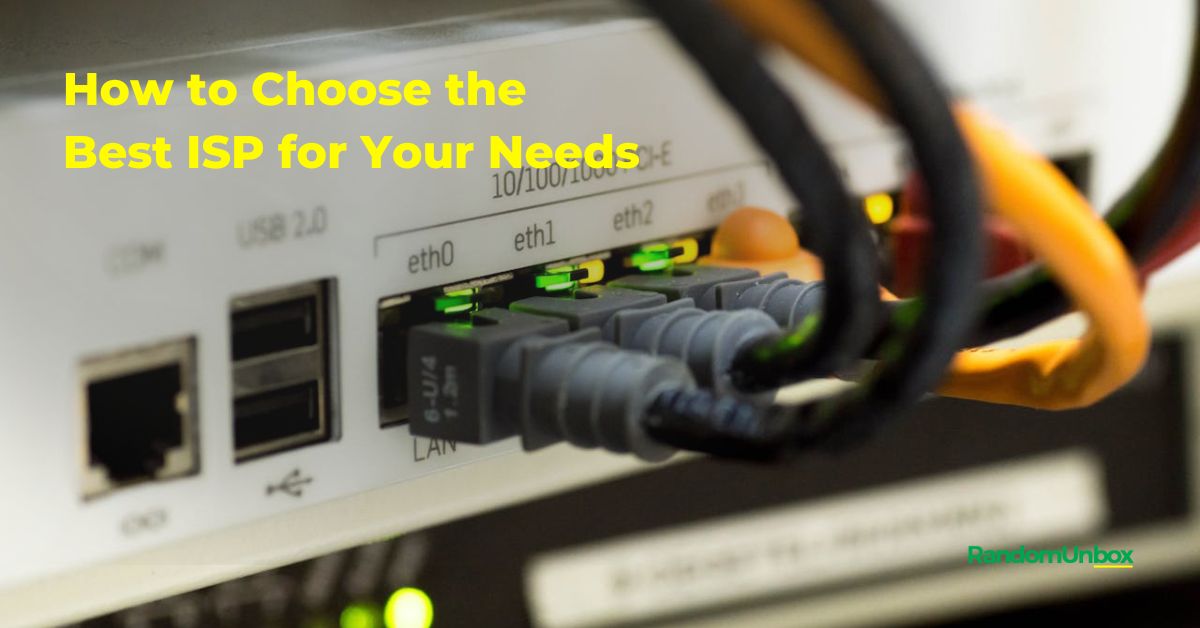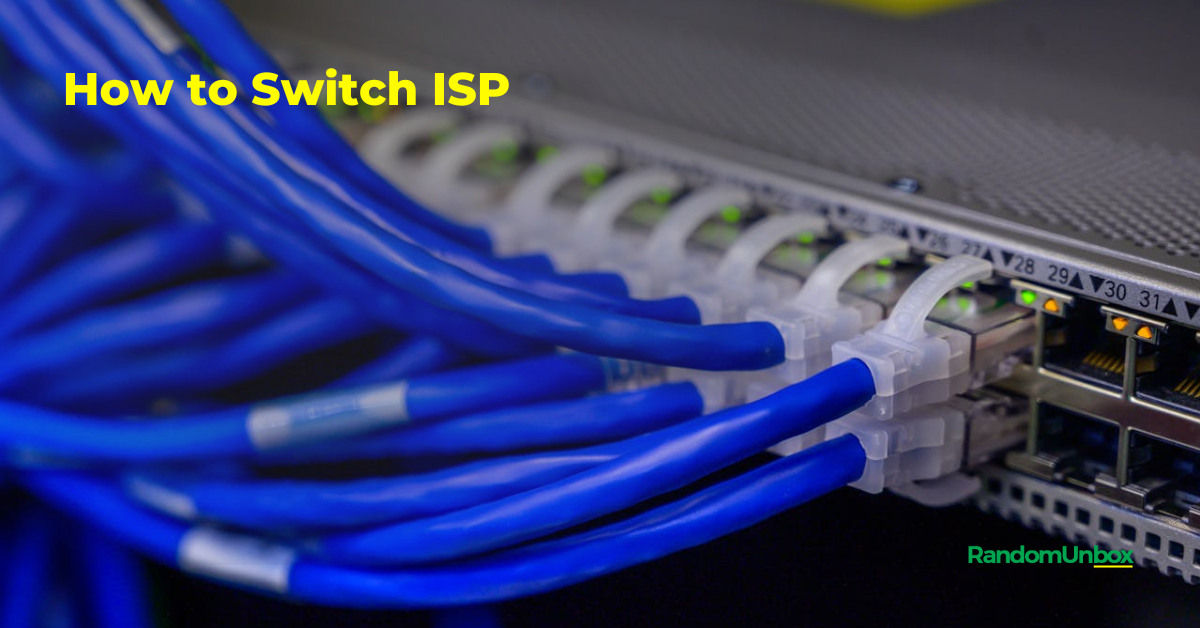Choosing the right Internet Service Provider (ISP) isn’t just about speed – it’s about finding the perfect fit for your needs. From price and reliability to customer service, there’s a lot to consider.
Here’s what matters most:
- Availability: Does the ISP offer service in your area? Check their coverage map before you dive in.
- Speed: How much bandwidth do you need for streaming, gaming, or working from home? Choose a plan that matches your usage.
- Price: Compare different plans and promotions to find the best value for your budget. Be sure to factor in hidden fees and equipment rentals.
- Reliability: Consistent, dependable internet is key. Research uptime guarantees and outage history before you commit.
- Customer service: Will they be there for you when you need help? Look for responsive, knowledgeable support options.
By taking the time to compare and understand your needs, you’ll be well on your way to enjoying a seamless and satisfying online experience.
Find the Perfect Internet Fit: Analyze Your Usage Needs
Picking the right internet provider is like finding a perfect pair of shoes – it needs to match your needs! But before you dive into options, take a step back and analyze your internet usage. Knowing your requirements is key to unlocking the best fit.
Here’s how to do it:
1. Count your crew: How many devices and users share the internet? More devices = more bandwidth needed.
2. Think about activities: Do you stream movies, game online, or video conference often? These activities require higher download speeds.
3. Data caps matter: Do you have data usage limits? Choose a plan that covers your needs without surprise overage fees.
4. Upload speed matters too: Need to upload large files or video chat regularly? Consider your upload speed needs as well.
5. Connection type check: Choose between cable, fiber, or DSL based on your location and desired speeds.
6. Budget wisely: Analyze your budget and choose a plan that aligns with your usage, not the other way around. Don’t overpay for features you don’t need!
Connection Types
Now, let’s explore the three main internet connection types, each with its own set of pros and cons:
- Fiber Optic: The speed demon, boasting lightning-fast speeds and superior reliability. Perfect for streaming, gaming, and large households, but often limited in availability and comes with a higher price tag.
- Cable: A widely available option offering decent speeds and affordability. However, speeds can fluctuate during peak hours, and data caps might be an issue for heavy users.
- Satellite: Reaches even remote areas, but comes with lower speeds, higher latency, and weather-dependent performance. Suitable for light internet users in underserved locations.
Key Terms Decoded: Navigating the Technical Lingo
- Mbps (Megabits per second): This measures download and upload speeds. Higher Mbps translates to faster data transfer.
- Data Caps: The limit on how much data you can use each month. Exceeding the cap incurs overage fees, so choose a plan that aligns with your usage.
- Contracts: Most ISPs offer contracts with locked-in rates, often for 12 months or longer. Be aware of early termination fees and explore flexible options if needed.
By understanding your internet habits, exploring connection types, and deciphering key terms, you’ve already taken a giant leap towards finding your perfect ISP match. Stay tuned for Part III, where we’ll delve into researching available ISPs and comparing their plans!
Find the Perfect Internet Plan: Price & Contract Hacks
Choosing the right internet provider isn’t just about speed. Price and contracts play a huge role! Here’s how to navigate like a pro:
1. Cash Check:
- Compare monthly costs, installation fees, and equipment charges across providers.
- Beware of hidden fees: data caps, overage charges, etc. They can bite!
- Factor in cancellation and early termination fees: avoid unpleasant surprises.
2. Contract Clarity:
- Read the fine print! Understand terms, potential price hikes after promotions, and data limits.
- Promotional offers and bundles: save money and snag extra services.
By being budget-savvy and contract-cautious, you’ll find the internet plan that fits your needs and wallet perfectly.
Researching Available ISPs
Finding the perfect ISP feels like navigating a dense internet jungle, but fear not, explorers! This section equips you with the tools and insights to identify providers lurking in your specific territory.
1. Unveiling Hidden Connections:
- Address Sleuth: The most direct approach is simply entering your address on your chosen ISP’s website. This usually delivers a clear yes or no answer, along with available plans.
- Zip Code Compass: Utilize online tools like HighSpeedInternet.com, BroadbandNow, or Allconnect. These platforms leverage your zip code to unveil all the ISPs serving your area, along with their plans and features.
- Neighborly Intel: Chat up your neighbors! Often, communities share knowledge about available ISPs and their experiences. This offers valuable, real-world insights beyond just technical specifications.
2. Comparison Websites: Your Digital Sherpas:
- Head-to-Head Showdowns: Websites like CNET and PCMag offer in-depth comparisons of popular ISPs. They analyze speeds, pricing, data caps, and customer service, helping you compare apples to oranges (or gigabytes to megabytes!).
- Local Focus: Consider regional comparison websites catering to your specific area. They often provide more granular information and insights relevant to your local market.
3. Customer Reviews: The Voice of the People:
- Beyond the Marketing Hype: Don’t solely rely on information directly from ISPs. Dive into customer reviews on platforms like Trustpilot and ConsumerAffairs. Read about real-world experiences regarding installation, customer service, and overall satisfaction.
- Focus on Specific Concerns: Look for reviews that align with your priorities. For example, if gaming is crucial, search for reviews mentioning gaming performance and latency issues.
4. Independent Testing: Unveiling the True Speed:
- Beyond Self-Proclaimed Claims: Don’t blindly trust an ISP’s advertised speeds. Check independent testing organizations like Ookla Speedtest and Akamai Speedtest. Run your own tests to gauge real-world performance in your area.
- Understanding the Nuances: Remember, advertised speeds are often “up to” a certain limit. Independent testing paints a more realistic picture of average or typical speeds you can expect.
Remember: This research phase is crucial. By utilizing these tools and strategies, you gain valuable insights into available options, allowing you to make an informed decision that aligns perfectly with your internet needs and budget. Happy exploring!
Comparing ISP Plans Head-to-Head
Choosing the right internet plan can feel like navigating a jungle of numbers and terms. Fear not! This table breaks down key features of different ISP plans, empowering you to make an informed decision.
- Download Speeds (Mbps): This measures how quickly data reaches your devices, impacting everything from streaming to downloads. Higher Mbps means faster loading times.
- Upload Speeds (Mbps): This measures how quickly data travels from your devices to the internet, important for video calls and online gaming.
- Data Caps (GB): This limits your monthly data usage. Exceeding it incurs overage fees, so choose a plan that aligns with your usage habits.
- Overage Fees: These charges kick in when you exceed your data cap. Carefully consider your usage and compare fees before choosing a plan.
- Equipment Rental Fees: Some ISPs charge monthly fees for modems and routers. Look for plans with included equipment or consider purchasing your own.
- Installation Fees: One-time fees for setting up your internet connection. See if promotional offers waive these fees.
- Contract Terms: Most ISPs offer contracts, locking you in for a specific period. Compare lengths and early termination fees before signing.
- Customer Service Options: Consider your preferred method of contacting support (phone, chat, online) and compare response times and quality.
Table: Comparing ISP Plans
| Feature | ISP 1 | ISP 2 | ISP 3 |
|---|---|---|---|
| Download Speed (Mbps) | 200 | 500 | 1000 |
| Upload Speed (Mbps) | 10 | 25 | 50 |
| Data Cap (GB) | 500 | 1 TB | Unlimited |
| Overage Fee | $10/GB | $5/GB | N/A |
| Equipment Rental | $10/month | Included | $5/month |
| Installation Fee | $99 | Free | $50 |
| Contract Term | 12 months | 24 months | No contract |
| Customer Service | 24/7 phone, chat | 8am-8pm phone, online | 24/7 online chat |
Interpreting the Table:
- Speeds: Higher numbers generally mean faster connections, but consider your usage needs.
- Data Caps: If you use a lot of data, choose a plan with a high cap or unlimited data.
- Fees: Compare all fees to get the best overall value.
- Contracts: Shorter contracts offer flexibility, but longer ones might have lower prices.
- Customer Service: Choose an option that suits your preferred method of contact and response time expectations.
Remember, the “best” plan depends on your individual needs and budget. Use this table as a starting point to compare and find the perfect ISP match!
Making Your Decision: Finding Your Perfect ISP Match
Navigate the ISP maze with confidence! Now you’ve compared plans and understand your needs, it’s time to choose the champion for your internet life. Let’s break it down:
Prioritize Your Needs:
- Speed Demon or Casual Surfer? Do you crave lightning-fast downloads and lag-free gaming? Prioritize high Mbps (megabits per second) speeds. For basic browsing and email, lower speeds might suffice.
- Data Cap Drama? If you stream movies and download large files, avoid restrictive data caps or choose unlimited plans. Remember, exceeding limits can incur hefty charges.
- Budget Boss: Set a realistic budget and stick to it. Don’t be swayed by flashy deals that sacrifice features you need. Consider hidden costs like equipment rentals and installation fees.
- Customer Service Superstar: Value reliable support? Prioritize providers with responsive customer service options, including 24/7 live chat or phone support.
Decision-Making Framework:
- Match your priorities to plan features. Does the plan tick all your “must-have” boxes?
- Compare apples to apples. Are you comparing similar plan types (fiber, cable, etc.)? Be mindful of different technologies’ inherent strengths and limitations.
- Mind the long game. Consider contract terms and potential price increases after introductory periods.
Switching & Negotiating:
- Switching Woes? Fear not! Most ISPs offer free self-installation kits, and many waive early termination fees when switching providers.
- Negotiation Ninja: Feeling stuck with your current provider? Politely call and inquire about better deals or promotions they may offer existing customers.
Helpful Resources:
- Sample Contracts: Understand what you’re signing before committing. Check your local consumer protection agency’s website for sample contracts.
- Troubleshooting Guides: Armed with knowledge, tackle common internet issues yourself. Many ISPs offer helpful troubleshooting guides online.
Remember: There’s no “one size fits all” solution. Choose the ISP that aligns best with your unique needs and budget. Happy surfing!
Bonus Tip: Utilize online comparison tools and consumer reviews to gain valuable insights from other users.
By following these tips and utilizing the provided resources, you’ll be well-equipped to make an informed decision and find the ISP that perfectly complements your digital lifestyle!
Boost Your Internet Experience: Finding the Right ISP Features
Beyond speed and price, your Internet Service Provider (ISP) has hidden gems! Discover features that enrich your experience and address your unique needs. Here’s what to consider:
| ISPs | Free Equipment Perks | Value-Added Services | Tailored Control | Top-Notch Support | Match Your Needs |
|---|---|---|---|---|---|
| Google Fiber | Free router and mesh Wi-Fi extenders | None | Advanced parental controls and customizable security features | 24/7 live chat and phone support | Variety of plans with different speeds and data caps |
| Verizon Fios | Free router and Wi-Fi extender | None | Advanced parental controls and customizable security features | Reliable customer service and technical support | Variety of plans with different speeds and data caps |
| CenturyLink | Free modem and router | None | Detailed network usage insights and parental control options | None | Affordable plans for basic internet needs |
| Xfinity | Free router | Parental controls, voice remote, and access to Xfinity Stream | None | None | Variety of plans with different speeds and data caps |
| Cox | Free router | Homelife protection with security features and identity theft monitoring | None | None | Affordable plans for basic internet needs |
| Spectrum | Free router | Virus protection and secure Wi-Fi | None | None | Variety of plans with different speeds and data caps |
| AT&T Fiber | Free router | None | Advanced parental controls and customizable security features | None | Variety of plans with different speeds and data caps |
| Frontier | Free modem | Detailed network usage insights and parental control options | None | None | Affordable plans for basic internet needs |
| EarthLink | Free modem | Customizable security filters and content management tools | None | None | Affordable plans for basic internet needs |
| Verizon | None | None | None | Reliable customer service and technical support | Variety of plans with different speeds and data caps |
| Sonic | None | None | None | Personalized, friendly customer service with local support teams | Variety of plans with different speeds and data caps |
| Comcast | None | None | None | None | Variety of plans with different speeds and data caps |
| Windstream | None | None | None | None | Affordable plans for basic internet needs |
| Starry Connect | None | None | None | None | Fixed wireless internet with fast speeds and no data caps in select areas |
Assess Customer Support and Reliability
Evaluating the quality of customer support and reliability is crucial when selecting an Internet Service Provider (ISP) for a seamless internet experience. To ensure you make an informed decision, consider the following:
- Evaluate customer service quality: Check reviews and ratings on platforms like Trustpilot or BBB to gauge the experiences of current customers.
- Test the reliability of customer support: Reach out with questions or concerns before signing up to see how quickly and effectively they respond.
- Consider the availability of customer service options: Look for ISPs that offer various support channels like live chat, phone support, or email for quick assistance.
- Prioritize responsive support: Opt for ISPs with a reputation for promptly resolving technical issues or service interruptions to minimize downtime and frustration.
Frequently Asked Questions
How Do You Determine Which Internet Service Provider You Should Use?
When determining which internet service provider to use, consider factors such as speed options, customer service quality, pricing plans, data limits, contract length, coverage area, router options, bundle deals, installation process, and reliability ratings for a comprehensive evaluation.
How Do I Choose the Right ISP?
When choosing an ISP, consider factors like speed options, customer service quality, contract length, data caps, price comparison, coverage area, equipment provided, bundled services, reliability reviews, and the installation process to make an informed decision.
Which ISP Do I Use?
When deciding on an ISP, consider factors like speed options, customer service, price comparison, coverage areas, contract length, router compatibility, data caps, installation process, bundle deals, and tech support. Research thoroughly to make an informed decision.
How Do I Choose an ISP for My Business?
When selecting an ISP for your business, consider factors such as speed requirements, budget considerations, reliability, customer service, contract terms, scalability options, network infrastructure, security measures, additional services, and location coverage to ensure optimal connectivity and support for your operations.
Conclusion
Phew! We’ve covered a lot of ground, exploring internet needs, ISP options, and plan comparisons. Remember, the “best” ISP isn’t universal – it’s the one that perfectly aligns with your unique usage and budget.
Key Takeaways:
- Know your needs: Streaming marathons? Online gaming wars? Identify your priorities to guide your search.
- Research is power: Compare plans, read reviews, and test speeds to make an informed decision.
- Don’t fear the switch: Switching ISPs is easier than ever. Negotiate with your current provider or confidently jump ship!
Share Your Story!
Did this guide help you navigate the broadband maze? Share your experiences, questions, or ISP triumphs in the comments below!
Ready for More?
Stay connected! Subscribe to our newsletter for tech tips, exclusive deals, and the latest broadband intel. Follow us on social media for all things internet and beyond!
Remember: Choosing the right ISP is an empowering step towards a seamless online experience. So, go forth, conquer the internet, and enjoy the journey!










